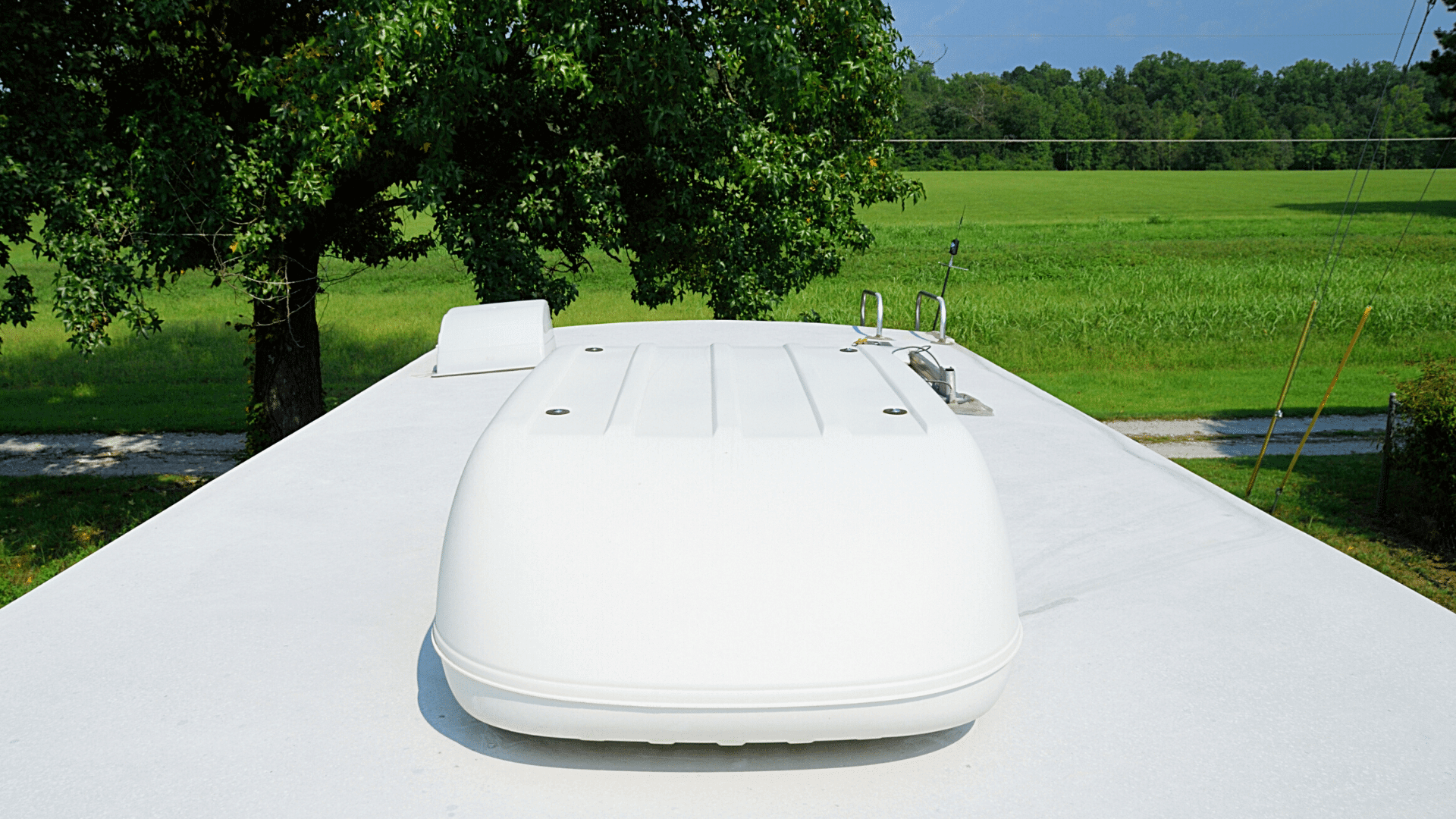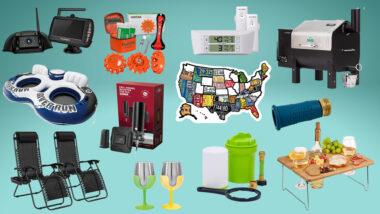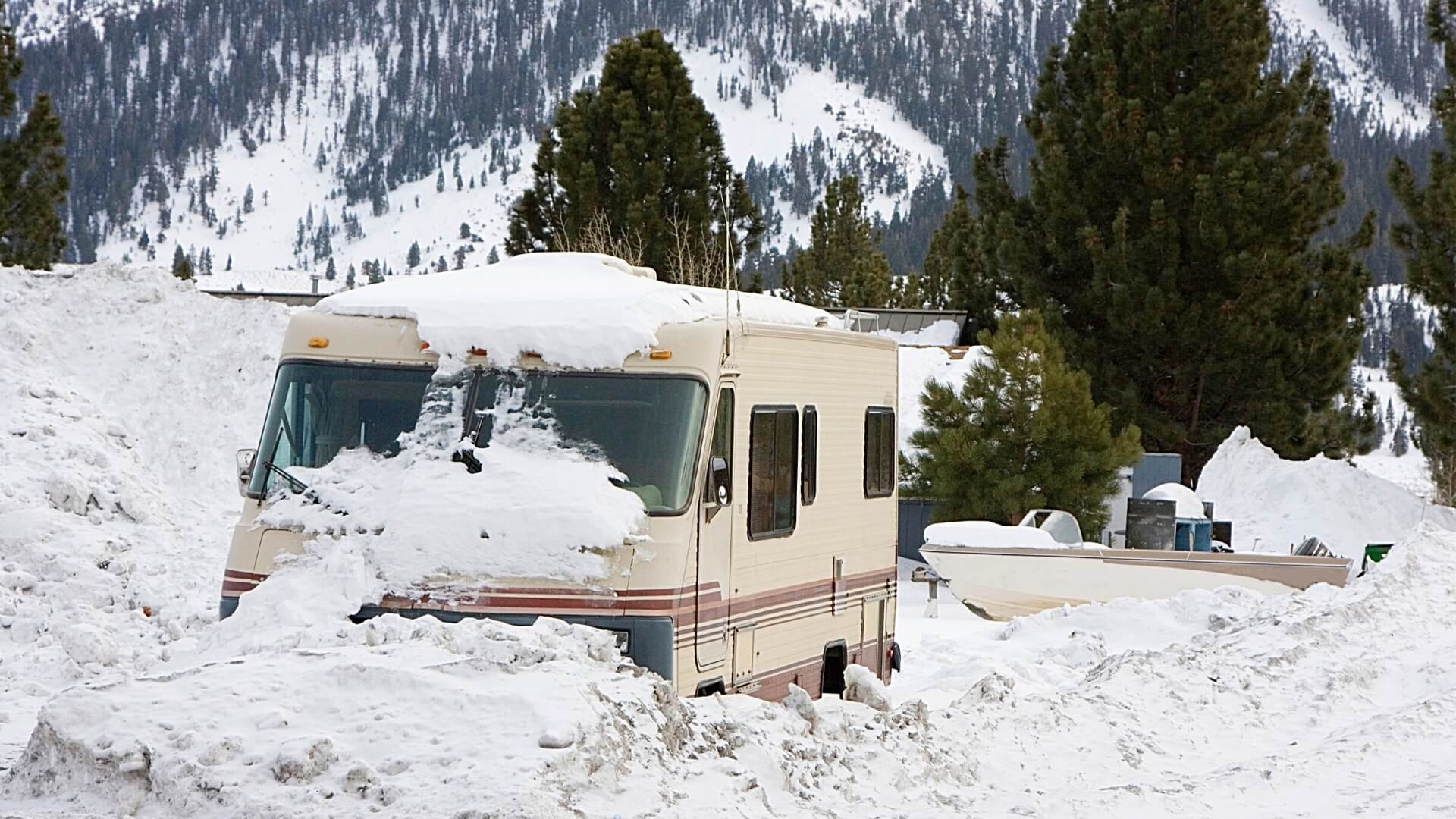Table of Contents Show
You’re ready to hit the road for that long-awaited summer camping trip. But, without the right air conditioner, your dream trip could soon turn into a nightmare filled with sticky, hot, sleepless nights and cranky days. Definitely not the summer memories you were looking for. You’re going to want to update your system before it’s too late. So, what is the best RV air conditioner?
Keep reading to find out what you need to consider to make the right choice and be sure to check out our top recommendations.
Types of RV Air Conditioners
There are a variety of air conditioners to choose from. Before you can decide what is the best RV air conditioner for your rig, you need to know what your options are.
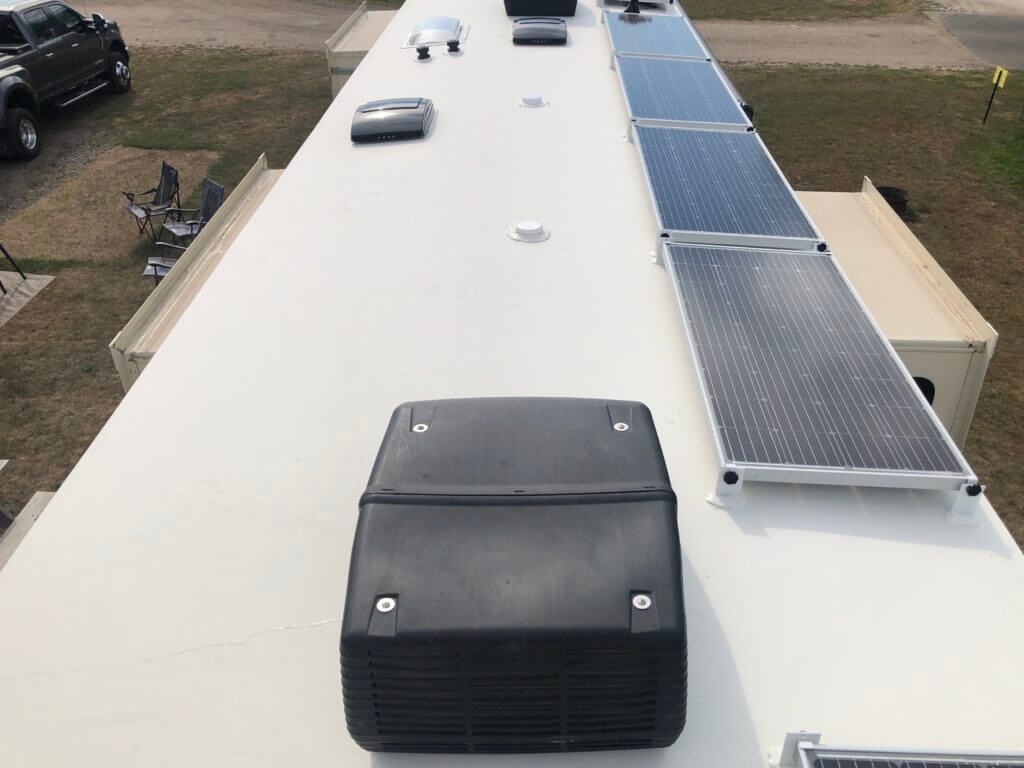
Rooftop
For most RVs, a rooftop air conditioning system is the standard. One of the primary reasons these are such a popular choice is because they don’t take up precious space inside your RV. Being on the top the RV opens up more room inside. This extra space can be a make or break for a successful camping trip, especially if you’re traveling with kids or friends. Another great thing about rooftop AC units is the possibility of having a ducted system that can ensure more even cooling.
If you’re considering getting or replacing a rooftop RV air conditioner, don’t forget to think about the installation. Will you be doing it yourself? If so, are you able to get up onto the roof safely, will you need more help, or are you going to pay someone to haul the AC unit up there and install it for you? These factors can play a role in deciding if this is the best RV AC unit for you.

Portable
Portable air conditioners can be useful for a variety of reasons. Since they are portable, you could use it not only in the RV on your trips, but when you’re home as well. Plus, if you’re not so savvy with all things installation, the portable RV air conditioner could be your best choice. All you have to do is plug it in, and you’ll be cool in no time!
A big downside however is the space it takes up inside your RV. Depending on the size of the unit, it could cut into an already small space.
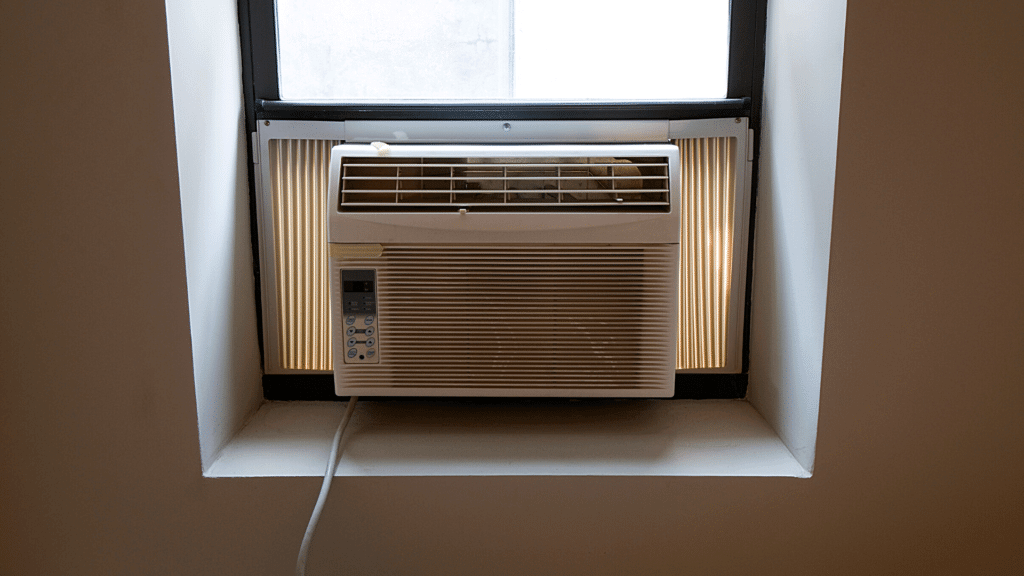
Window
Many people think of window AC units when they think about homes. But we can also use a window unit in an RV. One big draw for the window unit is that these air conditioners are simple to install, although they require a little more work than a portable system.
You’ll need to use a little more muscle to get the window unit set up in your RV. Another downside is that you will have to take the unit in and out every time you drive. For a long journey with multiple stops, this could be a huge inconvenience.
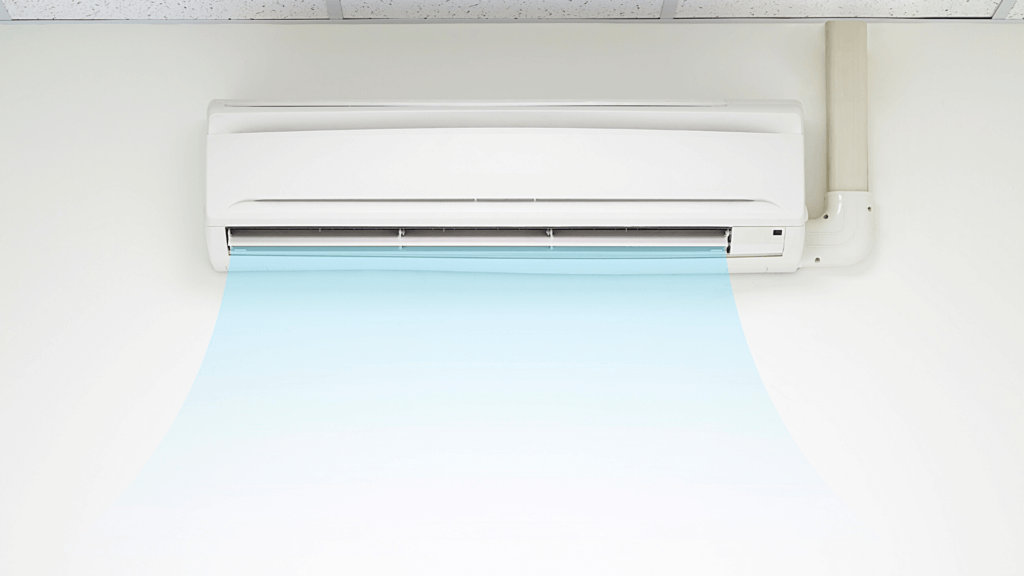
Mini-split
Another type of air conditioner is the mini-split. Although this unit is less well known, it could be the best type of RV air conditioner on the market. It is small, quiet, and able to cool your RV easily. It is also the most efficient, so you can save money in the long run.
The mini-split will require more installation work. There is an outside and inside unit for this air conditioner. Depending on how handy you are, you might need to hire someone to install a mini-split in your RV. However, there are some great tutorials for how to do this yourself if you’ve got some experience under your belt.
Key Features
When you are trying to find the best RV air conditioner, you need to consider several features.
BTU Power
The higher the BTU, the more cooling power you’ll have. The larger your RV is, the more BTU power you’ll want. In some larger rigs, you may even opt to have more than one AC unit.
Power Consumption
Some AC units are more efficient than others. If you are a full-timer or someone who stays somewhere for a month or more at a time, chances are you’ll have to pay for your electricity. Lower power consumption means lower energy bills for you. And even if your electricity is included in the nightly rate, focusing on lowering your power consumption is a practice we should all be doing to help take care of the planet and our resources.
Air Purifier
Some AC units can also purify your air. If you have allergies or pets, that extra air purification can really help. Also, do I need to remind you of the smell of the blackwater tank in your RV? No one wants those smells lingering in the air.
Cooling Capacity
If you’re not sure what cooling capacity you need, you can check out this awesome calculator. Run your numbers through this calculator to help you decide the BTU power needed to cool your space so you can pick a powerful enough unit.
Non-Ducted Units vs Ducted Units
A ducted unit means that there are ducts running throughout your RV with air vents distributed throughout the space.
Some RV air conditioning units are ducted, whereas others are not. The biggest pro of having a ducted unit is that you can ensure even cooling throughout the entire RV. A non-ducted unit on the other hand blows air in only one direction. This means you will have uneven cooling or you might have to add some fans to better circulate the air.
One downside of a ducted system is that your RV will have needed to have come with ducts from the manufacturer. It would be near impossible to add them after the fact. You’ll also need to make sure the RV air conditioner you’re going to buy will work with the ducting system you already have in place if applicable.
Other Considerations
When you’re deciding what is the best RV air conditioner here are some other things to consider. Depending on your personal preferences and needs, some or all of these may be worth keeping in mind before making your choice.
Noise
There is nothing worse than a noisy AC unit keeping you up at night. Typically, the quieter the better when trying to pick the best air conditioner.
Dual Use with Heat Pump
If you use your RV in the hot and the cold months having an air conditioner that can also heat your rig is a definite pro and it can save you money.
Vent position and number
The more vents and the more evenly they are spaced, the more evenly cooled your recreational vehicle. If you have the option to rotate the vents to point in a particular direction, you can also direct more air towards wherever you are spending more time (e.g., the living room during the day and the bedroom at night).
Size and Weight
Typically, you will want the smallest and lightest unit with the most power. A smaller unit may have less cooling capacity, but it will also save on weight. And smaller units are also easier to move around if you’re planning to install yourself.
Clearance height
Nothing would be worse than spending a pretty penny on a new rooftop RV and then hitting that beautiful new unit on a low overpass! You’ll want to sacrifice as little clearance height as possible while maximizing function and efficiency.
Insulation strength
If your air conditioner has poor insulation, you’ll lose lots of cool air in the summer and warm air in the winter. This means wasted energy and wasted money. So, make sure the AC you are getting has strong insulation.
Ease of installation
Installing your air conditioner, yourself could save you a lot of money. Some options involve little to no installation while others require significant work and skill. If you’re looking for a DIY system, ease of installation should definitely be on top of your list.
Maintenance & Cleaning Tips
Even if you have the best RV air conditioner on the market, things can soon become problematic if you don’t properly maintain the unit. By cleaning your AC regularly (at least 2 times a year for the outside and 4 times a year for the inside), you will ensure things are running smoothly and giving you the most cooling power possible.
Here are a few quick tips for keeping your AC running at its best.
Inside Filters
Remove the foam filters and clean gently with soap and water. Vacuum out any dust.
Outside condenser fin cleaning
Gently inspect the fins and realign any bent fins to allow optimal airflow. You can do this with a fin comb. Spray off the coils with water and/or a commercial AC cleaner to remove any dirt or debris build-up if needed. If electrical connections are exposed on your unit, cover them with plastic, and try to avoid getting them wet. Let everything dry before replacing the shroud.
Recommendations
If you’re feeling overwhelmed, don’t worry! We’ve compiled a list of the top AC units for each of the types of air conditioners.
Best Ducted Rooftop RV Air Conditioner
- HIGH-PERFORMANCE DESIGN: The Brisk 13.5K BTU offers larger air openings for improved air flow and cooling. Take it on...
- LIGHTER WEIGHT: EPP foam housing reduces weight and also improves cooling. With a lighter weight this will help decrease...
Why it’s best:
- Strong
- Quiet
- Energy Efficient
Best Non-Ducted Rooftop Unit
Why it’s best:
- Easy Installation
- Low Profile
- Quiet
Best Mini Split
- Alexa Enabled Mini Split AC/Heating System: Integrate with voice control or app, allowing you to adjust your mini split...
- Versatile 4-in-1 Mini Split: All-season solution with air conditioning, heat pump (functional up to 5F/-15C),...
Why it’s best:
- Acts as air conditioner, heater, dehumidifier, and fan
- Plenty of heat even in temperatures as low as 5 degrees F
- Even heating and cooling
- More efficient than standard RV models
Best Window Unit
- PERFECT FOR SMALLER ROOMS - Midea's Affordable Window AC unit is perfect to help your room be as comfortable as...
- ENERGY EFFICIENT- Midea's 5,000 BTU window air conditioner has a Combined Energy Efficiency Rate (CEER) of 11.0 which...
Why it’s best:
- Easy installation
- Washable Filter
- Energy Efficient
- Easy to Operate
- Fast Cooling
Best Portable
- Portable AC: Use this personal air conditioner & heater (16.5” x 14.06” x 27.09) in rooms up to 550 sq. ft. Stay...
- 4-in-1: Our 7000 BTU DOE (12000 BTU ASHRAE 128) AC and heater is also a dehumidifier & fan. This portable air...
Why it’s best:
- No installation
- Works as an air conditioner, heater, fan, and dehumidifier
- Compact
- Remote Control
So Which RV Air Conditioner is the Best? Take your pick of the units above, and you will enjoy a cool journey the next time you hit the road.
Last update on 2024-12-30 / Affiliate links / Images from Amazon Product Advertising API




